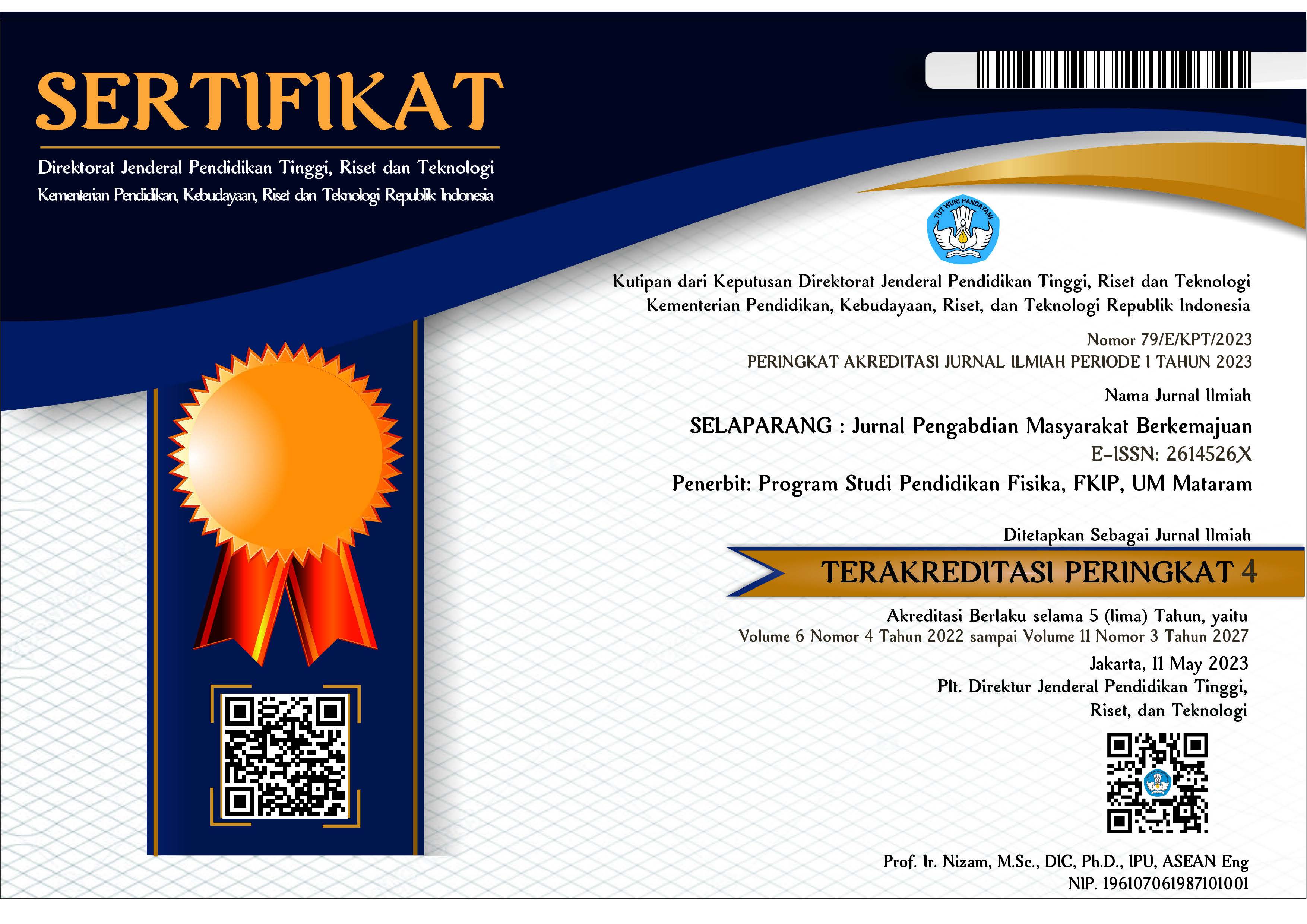Pendampingan akademik: peningkatkan kualitas penulisan makalah ilmiah mahasiswa
Abstract
Abstrak
Kegiatan pengabdian ini bertujuan untuk memberikan pelatihan dan pendampingan kepada mahasiswa dalam membuat makalah ilmiah yang berkualitas dengan memanfaatkan Artificial Intellegent (AI). AI yang digunakan meliputi ChatGPT, Scispace, Mendeley dan Turnitin. Pendekatan yang digunakan yaitu pendekatan praktis dengan beberapa tahapan yang meliputi melaksanakan perencanaan dan persiapan untuk mengetahui kebutuhan mahasiswa terhadap pelatihan yang diadakan, workshop secara luring, mentoring secara luring dan daring dengan membimbing mahasiswa dalam mengoperasikan AI dan menyusun makalah ilmiah secara lebih intensif, dan evaluasi dengan memberikan feedback terhadap kegiatan yang dilaksanakan. Sasaran dalam program ini yaitu mahasiswa FEB Universitas Tadulako sebanyak 23 orang. Hasil kegiatan menunjukkan bahwa mahasiswa mampu meningkatkan keterampilan dalam mengoperasikan AI secara tepat dengan melakukan prompting AI sehingga informasi yang diperoleh akurat dan kredibel. Selain itu, dengan bantuan AI dalam mencari dan menyaring referensi, mengembangkan ide, membangun argumen, dan menyusun tata bahasa yang terstruktur mampu mengefisienkan waktu dalam penyusunan makalah ilmiah. Dengan keterampilan tersebut, dalam waktu yang relatif singkat mahasiswa mampu menghasilkan makalah yang berualitas. Oleh karena itu, program ini terbukti secara efektif dapat membantu mahasiswa dalam menyusun makalah ilmiah.
Keywords: artificial intellegent; mentoring; training; ChatGPT.
Abstract
This service activity aims to provide training and assistance to students in making quality scientific papers by utilizing Artificial Intelligence (AI). The AI used includes ChatGPT, Scispace, Mendeley and Turnitin. The approach used is a practical approach with several stages which include carrying out planning and preparation to find out the needs of students for the training held, offline workshops, offline and online mentoring by guiding students in operating AI and compiling scientific papers more intensively, and evaluation by providing feedback on the activities carried out. The target in this program is 23 FEB students at Tadulako University. The results of the activity showed that students were able to improve their skills in operating AI appropriately by prompting AI so that the information obtained was accurate and credible. In addition, with the help of AI in searching and filtering references, developing ideas, building arguments, and drafting structured grammar is able to streamline time in the preparation of scientific papers. With these skills, in a relatively short time students are able to produce quality papers. Therefore, this program has proven to be effective in helping students in compiling scientific papers.
Keywords: artificial intellegent; mentoring; training; ChatGPT.
Keywords
Full Text:
PDFReferences
Absah, Y., Situmorang, S. H., Sembiring, B. K. F., & Gea, S. (2024). Pelatihan dan Pengembangan Peningkatan Kompetensi Penulisan Karya Ilmiah Bagi Dosen Universitas Prima Kota Medan. Jurnal Solusi Masyarakat (JSM), 2(1), 41. https://doi.org/10.29103/jsm.v2i1.15526
Aljuaid, H. (2024). The Impact of Artificial Intelligence Tools on Academic Writing Instruction in Higher Education: A Systematic Review. Arab World English Journal, 1(1), 26–55. https://doi.org/10.24093/awej/ChatGPT.2
Anthea, P., & Claudia, C. (2024). Artificial intelligence: The researcher’s assistant or sheep in wolf’s clothing? United European Gastroenterology Journal, 1354–1356. https://doi.org/10.1002/ueg2.12689
Bailey, R. (2018). Student Writing and Academic Literacy Development at University. Journal of Learning and Student Experience, 1(April), 7–7. https://www.researchgate.net/publication/332151711
Fagadau, I. D., Mariani, L., Micucci, D., & Riganelli, O. (2024). Analyzing Prompt Influence on Automated Method Generation: An Empirical Study with Copilot. IEEE International Conference on Program Comprehension, 24–34. https://doi.org/10.1145/3643916.3644409
Fazal, N., Tahir, M. S., Chaudhary, M., & Abbasi, M. (2024). Effectiveness of AI Integration into Computer-Assisted Language Learning (CALL) on Student Writing Skills Based on Gender. Pakistan Journal of Humanities and Social Sciences, 12(1), 224–230. https://doi.org/10.52131/pjhss.2024.v12i1.1974
Hostetter, J. W., Conati, C., Yang, X., Abdelshiheed, M., Barnes, T., & Chi, M. (2023). XAI to Increase the Effectiveness of an Intelligent Pedagogical Agent. Proceedings of the 23rd ACM International Conference on Intelligent Virtual Agents, IVA 2023. https://doi.org/10.1145/3570945.3607301
I. G. Mohammed, H. (2024). Examining and Assessing the Students’ Academic writing: an Analysis of the Students’ Research papers at English Department - Faculty of Arts& Science/ Alabyar Campus. مجلة آفاق للدراسات الإنسانية والتطبيقية, 1, 219–230. https://doi.org/10.37376/ajhas.vi1.4844
İmre, O. (2023). Artificial Intelligence and Article Writing. European Journal of Therapeutics, 29(4), 988–989. https://doi.org/10.58600/eurjther1706
Kammer, M. N. (2023). The Role of Artificial Intelligence in Scientific Writing. Journal of Clinical Case Reports Medical Images and Health Sciences, 3(3), 1–6. https://doi.org/10.55920/jcrmhs.2023.03.001116
Lemeš, S. (2024). Prompt Engineering. Artificial Intelligence in Industry 4.0: The Future That Comes True, 159–170. https://doi.org/10.5644/PI2024.215.08
Mehta, V., Thomas, V., & Mathur, A. (2024). AI-dependency in scientific writing. Oral Oncology Reports, 10(March), 100269. https://doi.org/10.1016/j.oor.2024.100269
Minglibayevna, B. B., & Yusupovna, N. M. (2024). ARTIFICIAL INTELLIGENCE AND TEXT-PROCESSING GENERATIVE TOOLS : EFFECTIVE USE OF CHATGPT IN WORKING WITH SCIENTIFIC TEXTS. Frontline Social Sciences And History Journal, 04(11), 8–19.
Nazari, M., & Saadi, G. (2024). Developing effective prompts to improve communication with ChatGPT: a formula for higher education stakeholders. Discover Education, 3(1). https://doi.org/10.1007/s44217-024-00122-w
Park, D., An, G. T., Kamyod, C., & Kim, C. G. (2023). A Study on Performance Improvement of Prompt Engineering for Generative AI with a Large Language Model. Journal of Web Engineering, 22(8), 1187–1206. https://doi.org/10.13052/jwe1540-9589.2285
Van Dijk, S. H. B., Brusse-Keizer, M. G. J., Bucsán, C. C., Van Der Palen, J., Doggen, C. J. M., & Lenferink, A. (2023). Artificial intelligence in systematic reviews: promising when appropriately used. BMJ Open, 13(7), 1–3. https://doi.org/10.1136/bmjopen-2023-072254
Zohny, H., McMillan, J., & King, M. (2023). Ethics of generative AI. Journal of Medical Ethics, 49(2), 79–80. https://doi.org/10.1136/jme-2023-108909
DOI: https://doi.org/10.31764/jpmb.v9i2.29783
Refbacks
- There are currently no refbacks.

This work is licensed under a Creative Commons Attribution-ShareAlike 4.0 International License.
______________________________________________________
Jurnal Selaparang
p-ISSN 2614-5251 || e-ISSN 2614-526X
EDITORIAL OFFICE:



















